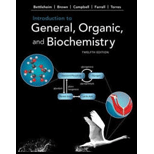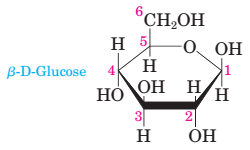
Introduction To General, Organic, And Biochemistry
12th Edition
ISBN: 9781337571357
Author: Frederick A. Bettelheim, William H. Brown, Mary K. Campbell, Shawn O. Farrell, Omar Torres
Publisher: Cengage Learning
expand_more
expand_more
format_list_bulleted
Concept explainers
Textbook Question
Chapter 16, Problem 68P
17-74 Glucose, C6H12O6, contains an

A cyclic hemiacetal is formed when the —OH group of one carbon bonds to the carbonyl group of another carbon.
(a) Which carbon in glucose provides the —OH group and which provides the —CHO group?
(b) Draw the alternative chair confirmations of  D-glucose and state which of the two is the
D-glucose and state which of the two is the
more stable.
Expert Solution & Answer
Trending nowThis is a popular solution!

Students have asked these similar questions
a. The change in the Gibbs energy of a certain constant pressure process is found to fit the expression:
AG-85.1 J mol −1 +36.5 J mol ¹K-1 × T
A. Calculate the value of AS for the process.
B. Next, use the Gibbs-Helmholtz equation:
(a(AG/T))
ΔΗ
-
T2
to calculate the value of AH for the process.
None
None
Chapter 16 Solutions
Introduction To General, Organic, And Biochemistry
Ch. 16.2 - Problem 17-1 Wrtie the IUPAC name for each...Ch. 16.2 - Prob. 16.2QCCh. 16.2 - Prob. 16.3QCCh. 16.4 - Prob. 16.4QCCh. 16.4 - Prob. 16.5QCCh. 16.4 - Problem 17-6 Show the reaction of benzaldehyde...Ch. 16.4 - Problem 17-7 Identify all hemiacetals and acetals...Ch. 16.5 - Prob. 16.8QCCh. 16 - 17-9 Answer true or false. (a) The one aldehyde...Ch. 16 - Prob. 2P
Ch. 16 - 17-11 What is the difference in structure between...Ch. 16 - 17-12 Is it possible for the carbon atom of a...Ch. 16 - 17-13 Which compounds contain carbonyl groups?Ch. 16 - 17-14 Following are structural formulas for two...Ch. 16 - 17-15 Draw structural formulas for the four...Ch. 16 - Prob. 8PCh. 16 - Prob. 9PCh. 16 - 17-18 Draw structural formulas for these ketones....Ch. 16 - 17-19 Write the JUPAC names for these compounds.Ch. 16 - Prob. 12PCh. 16 - 17-2 1 Explain why each name is incorrect. Write...Ch. 16 - Prob. 14PCh. 16 - Prob. 15PCh. 16 - 17-24 In each pair of compounds, select the one...Ch. 16 - Prob. 17PCh. 16 - 17-26 Account for the fact that acetone has a...Ch. 16 - 17-27 Pentane, 1-butanol, and butanal all have...Ch. 16 - 17-28 Show how acetaldehyde can form hydrogen...Ch. 16 - 17-29 Why can’t two molecules of acetone form a...Ch. 16 - 17-30 Answer true or false. (a) The reduction of...Ch. 16 - 17-3 1 Draw a structural formula for the principal...Ch. 16 - Prob. 24PCh. 16 - 17-33 What simple chemical test could you use to...Ch. 16 - 17-34 Explain why liquid aldehydes are often...Ch. 16 - 17-35 Suppose that you take a bottle of...Ch. 16 - 17-36 Explain why the reduction of an aldehyde...Ch. 16 - Prob. 29PCh. 16 - Prob. 30PCh. 16 - Prob. 31PCh. 16 - Prob. 32PCh. 16 - Prob. 33PCh. 16 - Prob. 34PCh. 16 - Prob. 35PCh. 16 - Prob. 36PCh. 16 - Prob. 37PCh. 16 - Prob. 38PCh. 16 - 17-47 What is the characteristic structural...Ch. 16 - Prob. 40PCh. 16 - Prob. 41PCh. 16 - Prob. 42PCh. 16 - Prob. 43PCh. 16 - Prob. 44PCh. 16 - Prob. 45PCh. 16 - 17-54 Following is the structure of...Ch. 16 - Prob. 47PCh. 16 - Prob. 48PCh. 16 - Prob. 49PCh. 16 - Prob. 50PCh. 16 - Prob. 51PCh. 16 - 17-60 1-Propanol can be prepared by the reduction...Ch. 16 - Prob. 53PCh. 16 - 17-62 Show how to bring about these conversions....Ch. 16 - Prob. 55PCh. 16 - Prob. 56PCh. 16 - Prob. 57PCh. 16 - Prob. 58PCh. 16 - 17-67 Draw structural formulas for these...Ch. 16 - Prob. 60PCh. 16 - 17-69 Propanal (bp 49°C) and 1-propanol (bp 97°C)...Ch. 16 - 17-70 What simple chemical test could you use to...Ch. 16 - Prob. 63PCh. 16 - Prob. 64PCh. 16 - Prob. 65PCh. 16 - 17-72 The following molecule is an enediol; each...Ch. 16 - 17-73 Alcohols can be prepared by the...Ch. 16 - 17-74 Glucose, C6H12O6, contains an aldehyde group...Ch. 16 - Prob. 69PCh. 16 - Prob. 70PCh. 16 - Prob. 71PCh. 16 - 17-78 Complete the following equation for these...Ch. 16 - 17-79 Write an equation for each conversion. (a)...Ch. 16 - Prob. 74P
Knowledge Booster
Learn more about
Need a deep-dive on the concept behind this application? Look no further. Learn more about this topic, chemistry and related others by exploring similar questions and additional content below.Similar questions
- Nonearrow_forwardConsider the structure of 1-bromo-2-fluoroethane. Part 1 of 2 Draw the Newman projection for the anti conformation of 1-bromo-2-fluoroethane, viewed down the C1-C2 bond. ✡ ぬ Part 2 of 2 H H F Br H H ☑ Draw the Newman projection for the gauche conformation of 1-bromo-2-fluoroethane, viewed down the C1-C2 bond. H F Br H Harrow_forwardPlease help me answer this question. I don't understand how or where the different reagents will attach and it's mostly due to the wedge bond because I haven't seen a problem like this before. Please provide a detailed explanation and a drawing showing how it can happen and what the final product will look like.arrow_forward
- Which of the following compounds is the most acidic in the gas phase? Group of answer choices H2O SiH4 HBr H2Sarrow_forwardWhich of the following is the most acidic transition metal cation? Group of answer choices Fe3+ Sc3+ Mn4+ Zn2+arrow_forwardBased on the thermodynamics of acetic acid dissociation discussed in Lecture 2-5, what can you conclude about the standard enthalpy change (ΔHo) of acid dissociation for HCl? Group of answer choices You cannot arrive at any of the other three conclusions It is a positive value It is more negative than −0.4 kJ/mol It equals −0.4 kJ/molarrow_forward
arrow_back_ios
SEE MORE QUESTIONS
arrow_forward_ios
Recommended textbooks for you
 Chemistry: Principles and ReactionsChemistryISBN:9781305079373Author:William L. Masterton, Cecile N. HurleyPublisher:Cengage Learning
Chemistry: Principles and ReactionsChemistryISBN:9781305079373Author:William L. Masterton, Cecile N. HurleyPublisher:Cengage Learning Introduction to General, Organic and BiochemistryChemistryISBN:9781285869759Author:Frederick A. Bettelheim, William H. Brown, Mary K. Campbell, Shawn O. Farrell, Omar TorresPublisher:Cengage Learning
Introduction to General, Organic and BiochemistryChemistryISBN:9781285869759Author:Frederick A. Bettelheim, William H. Brown, Mary K. Campbell, Shawn O. Farrell, Omar TorresPublisher:Cengage Learning

Chemistry: Principles and Reactions
Chemistry
ISBN:9781305079373
Author:William L. Masterton, Cecile N. Hurley
Publisher:Cengage Learning

Introduction to General, Organic and Biochemistry
Chemistry
ISBN:9781285869759
Author:Frederick A. Bettelheim, William H. Brown, Mary K. Campbell, Shawn O. Farrell, Omar Torres
Publisher:Cengage Learning
Acid-Base Titration | Acids, Bases & Alkalis | Chemistry | FuseSchool; Author: FuseSchool - Global Education;https://www.youtube.com/watch?v=yFqx6_Y6c2M;License: Standard YouTube License, CC-BY